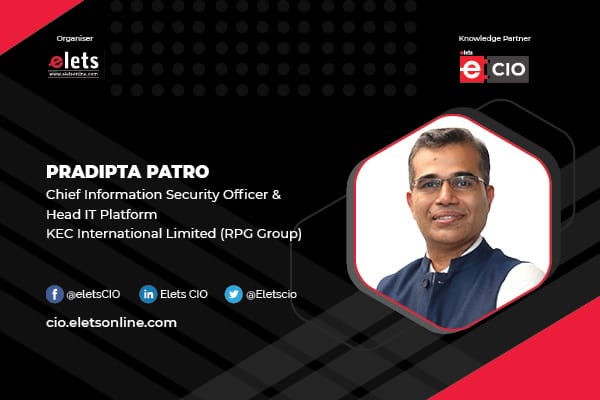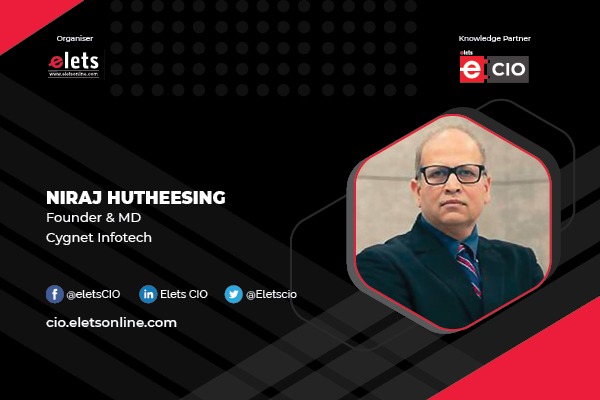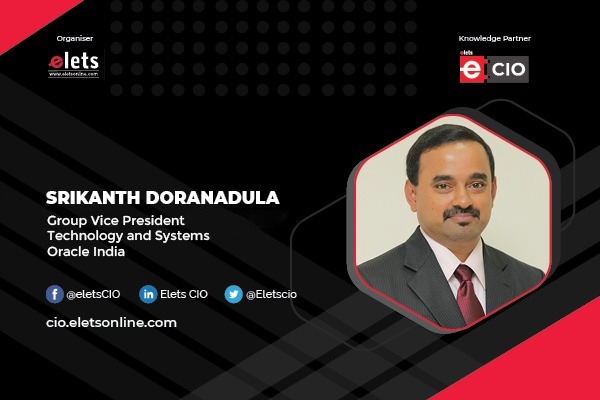
Artificial intelligence (AI), machine learning (ML), and natural language processing (NLP) are reshaping the way we approach data analytics. AI, ML, and NLP are all subsets of “cognitive analytics,” which is a method of identifying hidden patterns and correlations in data by leveraging human-like computer intelligence. To learn about the steady growth in the adoption of cognitive analytics and AI, Nidhi Shail Kujur of Elets News Network (ENN), interacted with Pradipta Patro, Chief Information Security Officer & Head IT Platform, KEC International Limited (RPG Group).
We are seeing steady growth in the adoption of cognitive analytics and AI. What is your take on the maturity level of enterprises globally for these futuristic initiatives?

Artificial Intelligence(AI) is the future technology and game changer across industries and domain.AI will impact globally and the rapid adoption and developments are definitely improving the cybersecurity posture across the domain and organisations and are key to cybersecurity defensive and offensive technologies.

Few changes we can see in the cybersecurity field:

1. Instead of being reactive, it is more proactive
2. Behaviours analysis
3. Automation to minimize human intervention for repeated activities or train the model to work for you
4. Automated response to the incidents with appropriate actions
5. Identifying the intrusion based on the data modelling and rules
6. Identifying, detecting, and protecting the phishing and alike
7. Enabling IA in Indicator of attack(IOA) ( IOA is an intention behind the attack techniques used by the threat actor to accomplish their objectives- credential theft, data exfiltration, credential exploitation and lateral movements etc)
There has been a significant uptick in demand for cloud computing and security professionals. What are the skillsets requirements and how can they be built?
As most of the innovations are happening in cloud and edge computing.
Now organisations across industries are adopting hybrid cloud for their workloads, applications-(IT) and operational technologies(OT). It’s imperative to align them with the business need, strategy and market dynamics. Hence there is a trend of demand for cloud professionals to manage the demand and skill required to develop, manage, operate, and secure cloud technologies. We need to create a learning culture for reskilling, and upskilling our employees or trainee graduates.
What are the significant factors impacting the security industry’s growth?
Last few years security is the key discussion point at the board level, security plays a very crucial role in our business and its strategy. Looking into the cyber security breaches across the industry and globe.
A few significant factors impacting security growth are:
1. Adoption of cloud across the industries
2. Digital transformation across the industries
3. Edge computing
4. AI and ML
5. Automation
6. Mobile workforces
7. Mobile technologies
8. Industry 4.0
What are the challenges organisations face in their digital transformation journey and how can they be addressed?
Digital transformation is not only adopting technologies but new applications also/ software and process reengineering that are more efficient and automated than traditional business practices and processes, it’s an entirely new, innovative way of doing something that is core to your business.
There are a few challenges below that should be addressed with value engineering and appropriate short-term and long-term roadmap.
1. Continuous Evolution of Customer Needs and users experiences
2. Driving the Adoption of new Tools & Processes
3. Lack of a Digital Transformation Strategy
4. Lack of Change Management Strategy
5. Culture Mindset including security by design
What, in your opinion, is the key to improving the customer experience?
Below are a few keys to improving the customer experience:
1. Simple and unified solutions
2. Use technology to create breakthrough customer experiences
3. Enable AI and Omni channel experiences
4. Faster and trusted support ecosystems
5. Ensure Security
6. Personalised
Be a part of Elets Collaborative Initiatives. Join Us for Upcoming Events and explore business opportunities. Like us on Facebook , connect with us on LinkedIn and follow us on Twitter.
"Exciting news! Elets technomedia is now on WhatsApp Channels Subscribe today by clicking the link and stay updated with the latest insights!" Click here!











